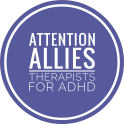With professional and personal interests in the subject matter, counsellor and therapeutic coach Sarah Guthrie takes a look at some of the potential interconnections between the highly sensitive person (HSP) and attention deficit hyperactivity disorder (ADHD) with a side order of rejection sensitive dysphoria (RSD) thrown in for good measure.
(5 minute read)
Have you ever experienced the feeling of having been plucked from obscurity and dropped into unfamiliar territory? Thirty-eight years on Earth have taught me that humans can feel like aliens, lone wolves walking among humans. Sometimes, life can feel like a Lord of the Rings trilogy – fighting fires and being unable to clear the cobwebs from your mind.
My ADHD diagnosis was an early one, as was my dyspraxia. I would often experience sensory overload. Sometimes, a small town in Sussex, UK, could feel like the hustle and bustle of London’s Piccadilly Circus. When I was a small child, I would check on my cuddly toys to make sure they were comfortable to curb my anxious feelings. This included ensuring they were facing up before bed every night. Fireworks, thunderstorms and banging doors – any loud noise – would scare me. I would walk around with my fingers in my ears, trying to block out the sounds.
I lived in London for most of my 20s, leaving in my early 30s. Stress formed a part of my life: fast-paced jobs; busy, noisy house shares; and long commutes to see friends on crammed tubes.
Understanding overwhelm
While I was training as a counsellor in my early 30s a conversation with my therapist led to a deeper understanding of my overwhelm. My therapist asked me if I had heard of the term “highly sensitive person” (HSP). I took a deep dive into all things HSP, reading The Highly Sensitive Person: How to Survive and Thrive When the World Overwhelms You by psychologist Dr Elaine N. Aron (originally published in 1996).
While useful in therapy for understanding sensitivity and managing overwhelm, HSP isn’t universally accepted or included in diagnostic frameworks. However, many therapists, especially those working with neurodiversity, use the HSP personality trait as a framework to validate experiences, improve emotional regulation and enhance well-being. By factoring in HSP to working methods with clients, we can see overlaps between HSP, RSD, ADHD, empaths and autism (ASD).
Highly sensitive people can be emotional sponges, especially if they are also empaths. While empaths share the traits of HSPs, they often feel other people’s emotions more deeply, sometimes experiencing those feelings as their own. HSPs can also be high sensation seekers who are easily bored and need variations in their routine.
I see countless clients, many of whom can relate to aspects of ADHD but for whom a diagnosis wouldn’t fit. This includes struggles with chronic stress, anxiety, low self-esteem, as well as procrastination, boredom, a desire to daydream and a fear of failure that brings with it people-pleasing tendencies. Being an HSP has many benefits. HSPs are seen as thoughtful, creative, conscientious, empathetic and intuitive, and often look at the bigger picture. For some of these clients, the concept of HSP can be a valuable framework to increase their understanding of their experience.
You may have read a recent blog post on this site (“Can autonomy, competence and relatedness be the ADHDers’ defence against RSD?”) about rejection sensitive dysphoria. RSD is an intense fear of rejection and failure. It can be debilitating for those who have it. Many of the highly sensitive clients (with and without ADHD) whom I have seen resonate with the symptoms of RSD. However, while there is no research explicitly linking RSD and HSPs, there have been studies linking emotional sensitivity, social anxiety and experiences of rejection. Psychologist and therapist Dr Ari Tuckman, who has written extensively about ADHD, including RSD, notes that people with ADHD who experience emotional dysregulation may often experience RSD-like symptoms. Moreover, a key component of Aron’s work is heightened emotional reactivity, a trait common in RSD. In other words, highly sensitive individuals might be more emotionally reactive, causing deeper emotional responses and leading to a perceived fear of rejection and criticism. In short, HSPs and those with RSD exhibit a heightened sensitivity to emotional and social situations. Additionlly, having RSD as well as being an HSP amplifies emotional distress, and a person with both may need more time to decompress and prioritise self-care in order to prevent burnout.
This information from my therapist gave me a new understanding of myself. Through therapy, I have learned to strengthen my mind–body connection, sit with my anxiety and calm my nervous system in ways I hadn’t before. This gave me the power to take control of thoughts and feelings – noticing what was my anxiety and what was someone else’s. Slowing down the mind and focusing on the body through mindfulness, movement, breathing, tapping and visualisations helps to manage overwhelm.
Next time someone says you are too sensitive or too weak, remember this: your personality is your strength. Society requires many personalities to thrive, and your sensitivity might be the key to your success.
Further information
For more information on Dr Ari Tuckman and the books he has written, visit https://tuckmanpsych.com/
For more information on Dr Elaine N. Aron and her work, visit: https://hsperson.com/
To complete the HSP questionnaire visit: https://hsperson.com/test/highly-sensitive-test/
To complete the HSS questionnaire visit: https://hsperson.com/test/high-sensation-seeking-test/
Reference
Aron, Elaine N. 1996. The Highly Sensitive Person: How to Survive and Thrive When the World Overwhelms You.
Click the links if you'd like to visit Sarah’s therapy website or her directory entry on Attention Allies.
Published 6 January 2025
All rights reserved © Copyright Sarah Guthrie 2025. Unauthorised use and/or duplication of this material without express and written permission from the author of this post is strictly prohibited. Author contact via website Contact page.
Website version and image © Copyright Attention Allies 2025.
